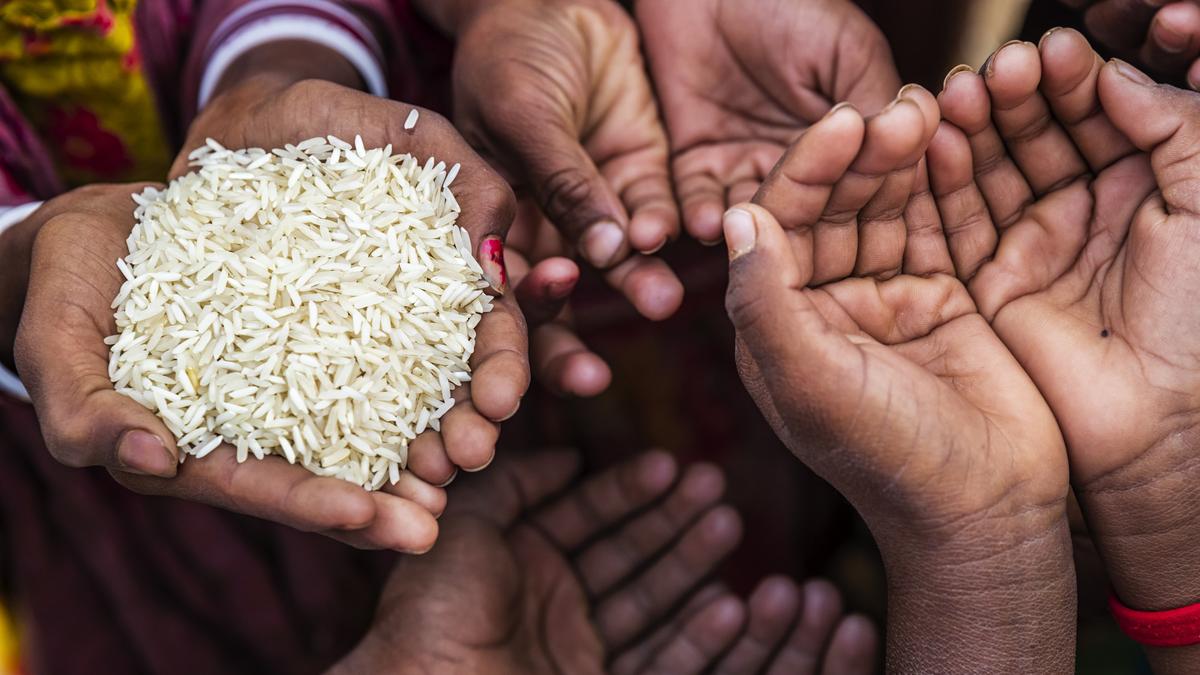‘Problems with the PDS are not limited to enrolment and access. There is also the flow of corruption’
| Photo Credit: Getty Images/iStockphoto
In 2023, there was a report discussing the right to food in the context of Jharkhand. Similarly, a few days ago, there was another report that was in the context of Odisha. These reports highlighted something alarming — that a substantial number of households have been removed from the rolls of the Public Distribution System (PDS). This disturbing situation is not limited to Jharkhand and Odisha. Bihar, another State in the east-central region, has its own PDS tragedy.
The example of the Musahar community
Bihar was blighted by a supply crisis, when rations were needed the most, at the time of the COVID-19 pandemic. Since then, there are communities which continue to be in want of a stable supply of ration. This is more notable among extremely marginalised communities such as the Musahars. This is a community that has been pushed beyond the edge of destitution by the socio-politics of caste. Its struggle with the PDS emerges as a significant symptom of the same.
A number of Musahar households in Patna district do not have an active ration card. Even if they do have one, there is another problem — the card does not have the names of all the family members.
There are also several people who have lost access to their monthly supply of ration ever since biometric verification was made mandatory at fair price shops (FPS). In such cases, the individuals concerned are forced to get a new ration card as after verification it emerges that their names have been struck off the PDS rolls. The ruling dispensation and its over the top marketing of ‘smart cities’ clearly posits before us the disconnect between the government and the people most in need of state welfare.
Problems with the PDS are not limited to enrolment and access. There is also the flow of corruption through the veins of the system. Households enrolled with the PDS have reported that FPS dealers have been releasing only four kilograms of food grain/person when a below poverty line (BPL) household which has a Priority Household (PHH) ration card is entitled to five kilograms a person. The four kilograms of grain being issued is rice, which is the lowest quality of ‘Usna’ rice. No amount of wheat is issued.
Documentation that has no legal basis
Coming back to the issue of enrolment in PDS. The Government of Bihar offers its citizens the option to file a ration card application using a paper-based application form or by filling in an online application form through its e-PDS portal. The first option requires the Aadhaar details of the applicant and their family members. The second option requires an extra set of documents, namely caste certificate, income certificate, and residence certificate. Even when the applicant uses the first method, the officials eventually demand these certificates.
The demand for such documents is not exclusive to Bihar. Jharkhand also makes such a demand while Uttar Pradesh makes it mandatory to provide an income certificate, and Madhya Pradesh requires the submission of proof of residence.
The requirements of these certificates do not have any legal basis. Neither the National Food Security Act (NFSA) of 2013 nor the PDS control order of 2015 explicate the requirement of such documents. An officer from the Food and Consumer Protection Department in Bihar has confirmed that the requirement of those certificates is an oversight in the online system. Here again we see that in the race towards digitisation and e-governance, governments have shed all and any conception of governance and citizen welfare.
The issue of exploitation
It is notable, and most unfortunate, that the government, which has complete awareness of its systemic flaws, has made no attempt at systemic change and that people continue to be crushed under the weight of official indifference. To make matters worse, this hubris of power has provided the perfect conditions for the creation of a market of exploitation.
Most of the people, especially in the Musahar community, who seek to avail the benefits of PDS, neither have the resources nor the knowledge to interact with online processes. This situation has been aggressively exploited by middlemen who charge a sum that is north of ₹3,000 to have a ration card made. Within this market of exploitation, it is not uncommon to hear that neither document was issued nor the middleman traceable after payment.
Amidst the myriad challenges, if the people are somehow able to file their application, there is still no guarantee that they will get their ration card. While the 2015 order states that ration card should be issued within 30 days of the application being filled, there are cases of people whose applications have been pending for long — between four to 18 months. These applications are not for an entitlement which goes above and beyond the diurnal needs of a person. They are for the basic means of subsistence. It has been 24 years since the right to food was recognised as a fundamental right in the case, People’s Union of Civil Liberties vs Union of India. Since then, governments have wound bureaucratic red tape around it so tightly that it is choking the very people it was meant for.
Ananye Krishna is Field Researcher at the DEVISE Charitable Trust. Shailendra Kumar is Field Researcher at the DEVISE Charitable Trust
Published – January 09, 2025 12:08 am IST
